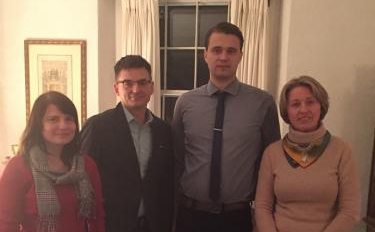Recap: Poland-Lithuania and the Great Northern War
On March 4th, the Russian and East European Reading group, co-sponsored with the Baltic Studies Program, held the meeting during which Dr. Mindaugas Sapoka, the researcher at the Lithuanian Institute of History and J. P. Kazickas Post-Doctoral Associate in European Studies at Yale University, presented a paper, entitled ‘Poland-Lithuania and the Great Northern War: what did Peter the Great gain and Charles XII lose with their Polish policy?’
Dr. Sapoka is a historian of early modern Eastern and Central Europe, with a focus on Poland and Lithuania. He has extensively published on the Polish-Lithuanian Commonwealth in the early eighteenth century.
As J. P. Kazickas Post-Doctoral Associate, dr. Sapoka has been working on his book “The Great Northern War, 1700-1721: The War Which Shaped Europe” which will be the first assessment of the war in any language. In his talk, dr. Sapoka emphasized the crucial role of the Polish-Lithuanian Commonwealth in the Great Northern War. He also told how the Polish policy of Russian Tsar Peter the Great ultimately secured him a victory in the war. The victory marked the rise of Russia’s military, political, and cultural hegemony in eastern and northern Europe.
In 1947, while in Germany, Joseph P. Kazickas received a scholarship from Yale that enabled him and his family to emigrate to America as refugees from communist Lithuania. He completed his Ph.D. in economics in 1951 and pursued a successful career as a business entrepreneur. In 2012 the Kazickas Family Foundation established the Joseph P. Kazickas Post-Doctoral Fellowship at Yale to support the Baltic Studies program in the MacMillan Center’s Council on European Studies. The Fellowship provides resources for visiting scholars and researchers from Lithuania to study at Yale and organize workshops and seminars on campus about issues relevant to the Baltic Sea region.
